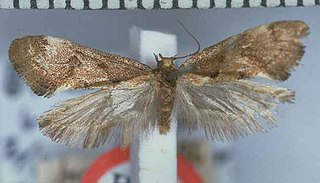
Lichenaula lichenea is a species of moth of the family Xyloryctidae. It is known in Australia from the Australian Capital Territory, New South Wales and Queensland.
Dichomeris sevectella is a moth in the family Gelechiidae. It was described by Francis Walker in 1864. It is found in Guyana and Amazonas, Brazil.
Hypatima euplecta is a species of moth in the family Gelechiidae. It was described by Edward Meyrick in 1904. It is found in Australia, where it has been recorded from Queensland, New South Wales, Victoria and South Australia.
Aroga elaboratella is a moth of the family Gelechiidae. It is found in North America, where it has been recorded from California and Baja California.
Alsodryas lactaria is a species of moth in the family Gelechiidae. It was described by Edward Meyrick in 1914. It is found in Guyana.
Recurvaria saxea is a moth of the family Gelechiidae. It is found in Brazil (Para).
Filatima gomphopis is a moth of the family Gelechiidae. It is found in North America, where it has been recorded from Texas.
Antaeotricha episimbla is a moth of the family Depressariidae. It is found in Guyana.
Antaeotricha modulata is a species of moth of the family Depressariidae. It is found in Brazil, Guyana and French Guiana.
Paraspastis circographa is a moth of the family Depressariidae and the only species in the genus Paraspastis. It is found in Guyana.
Gonioterma pleonastes is a moth of the family Depressariidae. It is found in French Guiana.
Chlamydastis synedra is a moth of the family Depressariidae. It is found in Paraguay.
Stenoma hopfferi is a moth of the family Depressariidae. It is found in Brazil (Pará) and the Guianas.
Orphnolechia acridula is a moth of the family Depressariidae first described by Edward Meyrick in 1918. It is found in French Guiana.
Depressaria prospicua is a moth in the family Depressariidae. It was described by Edward Meyrick in 1914. It is found in South Africa.
Psittacastis trierica is a moth in the family Depressariidae. It was described by Edward Meyrick in 1909. It is found in Bolivia.
Hypercallia orthochaeta is a moth in the family Depressariidae. It was described by Edward Meyrick in 1913. It is found in Peru.
Stenoma picrantis is a moth in the family Depressariidae. It was described by Edward Meyrick in 1930. It is found in Pará, Brazil.
Chlamydastis trastices is a moth in the family Depressariidae. It was described by August Busck in 1911. It is found in French Guiana and Guyana.

Tingena brachyacma is a species of moth in the family Oecophoridae. It is endemic to New Zealand and has been found in the south of the South Island. This species inhabits open swamps, native forest and scrubland and has been collected amongst Leptospermum. The adults of the species are on the wing in November and December.

